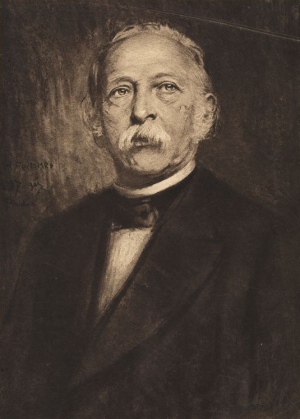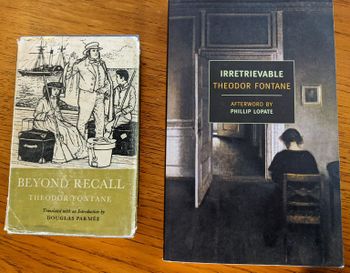Theodor Fontane: Difference between revisions
imported>Pat Palmer (→Unterm Birnbaum: adding image of book and its translation) |
imported>Pat Palmer (→Unwiederbrichlich, 1891: adding image of Beyond Recall (Parmée translation)) |
||
| Line 39: | Line 39: | ||
=== Unwiederbrichlich, 1891 === | === Unwiederbrichlich, 1891 === | ||
{{Image|Beyond Recall cover.jpg|right|350px|Douglas Parmée's translation of Unwiederbringlich (© Oxford University Press 1964, "The World's Classics" #602).}} | |||
This famous novel is about a troubled marriage in Holstein in 1859-1861, five years before the German/Danish war. Some translations to English have been made: | This famous novel is about a troubled marriage in Holstein in 1859-1861, five years before the German/Danish war. Some translations to English have been made: | ||
Revision as of 13:44, 7 December 2020
Theodor Fontane (1819 – 1898) was a popular 19th-century German-language novelist whose works are still widely read in German but are not as commonly found in English translation. Most of Fontane's life was spent in cosmopolitan Berlin, the thriving capital of Bismarck's newly-unified Germany. After a successful career in journalism and travel writing, beginning in his late fifties, Fontane produced a novel every two or three years until the end of his life[1]. Several of these later works are considered masterpieces.
Fontane is known as a writer of realism, not only because he was conscientious about the factual accuracy of details in fictional scenes, but also because he depicted his characters in terms of what they said or did and refrained from overtly imputing motives to them. The world of these novels is one in which everyone seems powerless, constrained by convention if nothing else. The novels delve into topics that were more or less taboo for discussion in polite society of Fontane's day, including marital infidelity, class differences, urban vs. rural differences, abandonment of children, and suicide. His characters range from lower-middle class to Prussian nobility.
Fontane's novels are especially challenging to translate, because (for example) they may contain subtle, lyrical linguistic motifs, some of which are as clear in German as the famous musical motifs in Prokofiev's Peter in the Wolf, but which do not render equivalently into in English.
Lastly, these are not action novels. Some have been called novels of manners, and impatient readers may find the plot slow-moving. Character is often developed through a series of seemingly insignificant, everyday events; yet, there are no sentences or details which can be considered superfluous to the story's eventual shape.
English translations for the more famous works.
This is still very incomplete, for now.
Unterm Birnbaum
This still popular novella, first published in 1885, is a crime story, where almost from the outset, the reader knows that a murder is planned and carried out, and by whom. A village merchant and his wife, over the years, have fallen gradually into serious debt, and the person sent to collect the amount due disappears. The details of the crime remain untold, while the narrative focuses on what others think happened, how a small town's community opinion vacillates over time, and how the community opinions affect the perpetrators. The reader cannot easily predict whether they will ever be caught. As with some other of Fontane's best works such as Effi Briest and Beyond Recall, the plot was patterned roughly around a real event reported years before the novella was written and that Fontane had read about. The majority of the novel consists of richly nuanced conversations among the town's denizens about the married couple at the center of the controversy.
There is at least one English translation:
- Under the Pear Tree translated by Patricia Tiney; Huddersfield : Belgarun, 2009 (print-on-demand)
Irrungen, Wirrungen, 1888
This novel is about an affair between a wealthy officer and a lower-middle-class Berlin girl. Some English translations exist:
- Delusions, Confusions translated by William L. Zwiebel, ISBN-13: 978-0826403261
- Trials and Tribulations (1888)
- On Tangled Paths - translated by Peter James Bowman; Penguin reprint (June 6, 2013), 189 pages.
Die PoggenPuhls, date?
(description tbd). At least one English translation has been made:
- The Poggenpuhl Family translated by Gabriele Annan, ISBN-13: 978-0826403261
Unwiederbrichlich, 1891
This famous novel is about a troubled marriage in Holstein in 1859-1861, five years before the German/Danish war. Some translations to English have been made:
- Beyond Recall[2] translated by Douglas Parmée; London, Oxford University Press, 1964 (out of print)
- Irretrievable translated by Douglas Parmée; reprint with title change, New York Review of Books, 2011 (Kindle)
- No Way Back, translated by Hugh Rorrison and Helen Chambers; Angel Classics, London, 2010 (availability?)
Note the variety of ways even the title has been translated. It could easily have been translated to something like Gone with the Wind, had that title not already existed by another author.
Frau Jenny Treibel, 1892
This novel is about attempts by a schoolmaster's daughter to marry new wealth.
- tbd
Effi Briest, 1894
This novel is about a wronged husband conventionally seeking retribution for a long-past affair. At least one English translation has been made:
- Effi Briest tranlated by Philip Dossick, Griffin Classic Books 2017 (ebook)
Notes
- ↑ Encyclopedia Brittanica on Theodor Fontane, last access 12/1/2020.
- ↑ Beyond Recall (Unwiederbringlich) by Theodor Fontane, Translated with an Introduction by Douglas Parmée. London, Oxford University Press, 1964. Volume 602 in The World Classics


